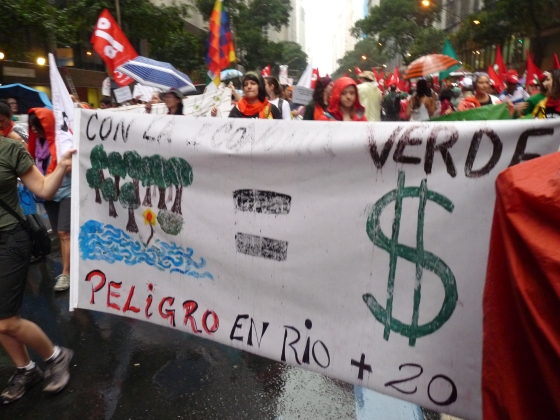 The Miami Herald reports: “More than 50,000 people and representatives of more than 120 countries gather in Rio de Janeiro for the opening of the Rio+20 conference on sustainable development. Topics include the destruction of the rain forest, vanishing coral reefs, land grabs, the need for food security, clean water, the role of women in food production, safe drinking water, energy access, clogged transit systems, jobs and sustainable development as a way of fighting poverty. The conference marks the 20th anniversary of the 1992 Earth Summit in Rio.”
The Miami Herald reports: “More than 50,000 people and representatives of more than 120 countries gather in Rio de Janeiro for the opening of the Rio+20 conference on sustainable development. Topics include the destruction of the rain forest, vanishing coral reefs, land grabs, the need for food security, clean water, the role of women in food production, safe drinking water, energy access, clogged transit systems, jobs and sustainable development as a way of fighting poverty. The conference marks the 20th anniversary of the 1992 Earth Summit in Rio.”
Many environmental and indigenous groups and social movements attending the conference and the adjacent “People’s Summit” are questioning and criticizing the “green economy” approach as offering “false solutions.” — also see: Rio 20, Gears of Change
WINNIE OVERBEEK, winnie at wrm.org.uy
Overbeek is the executive secretary of World Rainforest Movement (Brazil/Uruguay). She wrote the piece “The Great Lie: Monoculture Trees as Forests,” which states: “Tree plantation companies were ‘pioneers’ in the green economy when, in the early 1990s, they started to influence public opinion with claims about the ‘sustainable production cycle’, promoting the positive idea that they were planting carbon-absorbing ‘forests’. However, the negative impacts of large-scale monoculture plantations on local communities and increasing unsustainable paper consumption, especially in the North, were left unmentioned.
“Monoculture oil palm, eucalyptus, rubber and jatropha plantations are also expanding, validated by their alleged ‘green’ benefits such as agrofuel production and carbon sequestration. Locating such plantations in the South allows polluting projects in the North to continue business as usual, due to the idea of the carbon tradeoff.
“Under the United Nations collaborative program on Reducing Emissions from Deforestation and Forest Degradation (known as REDD), carbon — not wood or pulp — has become the ‘product’ that offers the best market value and profits from trees. Those who pollute most can continue to evade their responsibility to reduce carbon emission levels by opting for the often cheaper alternative of ‘compensating’ their emissions by buying credits from carbon stored in forests. ‘REDD+’ goes further, including conservation, sustainable management of forests and enhancement of forest carbon stocks.
“By commodifying forests, initiatives like REDD and REDD+ may weaken the struggles of forest peoples to guarantee rights to their historic lands and livelihoods. Carbon trading is likely to be distant from local communities’ needs and can impact severely on the lives and opportunities of local people.”
PATRICK BOND, pbond at mail.ngo.za
Professor at the University of KwaZulu-Natal in South Africa, Bond is author and editor of the recently-released books Politics of Climate Justice and Durban’s Climate Gamble. He wrote the piece “The Green Economy is the Environmentalism of the Rich,” which states: “Perhaps a few environmentally decent projects may get needed subsidies as a result of the G20 and Rio talkshops, and we’ll hear of ‘sustainable development goals’ to replace the fatuous UN Millennium Development Goals in 2015. But the overarching danger is renewed official faith in market mechanisms. No surprise, following the logic of two South African precedents: the 2002 World Summit on Sustainable Development in Johannesburg (Rio+10) and last December’s Durban COP17 climate summit. There, the chance to begin urgent environmental planning to reverse ecosystem destruction was lost, sabotaged by big- and medium-governments’ negotiators acting on behalf of their countries’ polluting and privatizing corporations.”
Bond also recently wrote “Inclusive Green Growth or Extractive Greenwashed Decay?”
PABLO SALON, solon at focusweb.org
Salon is the executive director of Focus on the Global South (Bolivia) and was the former ambassador from Bolivia to the United Nations. In his recent piece “At the Crossroads Between Green Economy and Rights of Nature,” he stated: “Nature cannot be submitted to the wills of markets or a laboratory. The answer for the future lies not in scientific inventions that try to cheat nature but in our capacity to listen to nature. Science and technology are capable of everything including destroying the world itself. It is time to stop geo-engineering and all artificial manipulation of the climate, biodiversity and seeds. Humans are not gods.”
LUCIA ORTIZ, lucia at natbrasil.org.br
Ortiz is a coordinator for Friends of the Earth, Brazil. She stated: “World leaders meeting at the Rio+20 Summit should listen to the demands of the alternative Peoples’ Summit in Rio to prove that the UN’s decision-making process and our governments take into account the greater public interest before profit. … The Rio+20 Summit should not promote the ‘green economy’ agenda, which is selling out nature and people, and greenwashing an unjust and unsustainable economic system.”